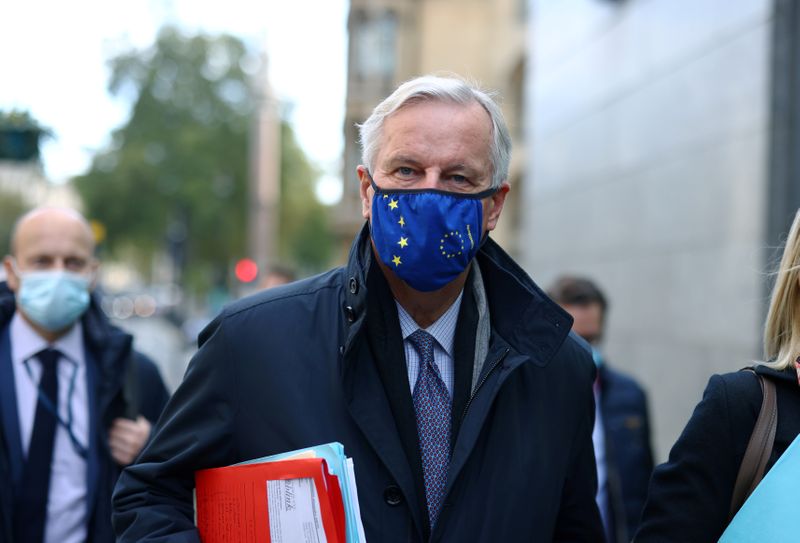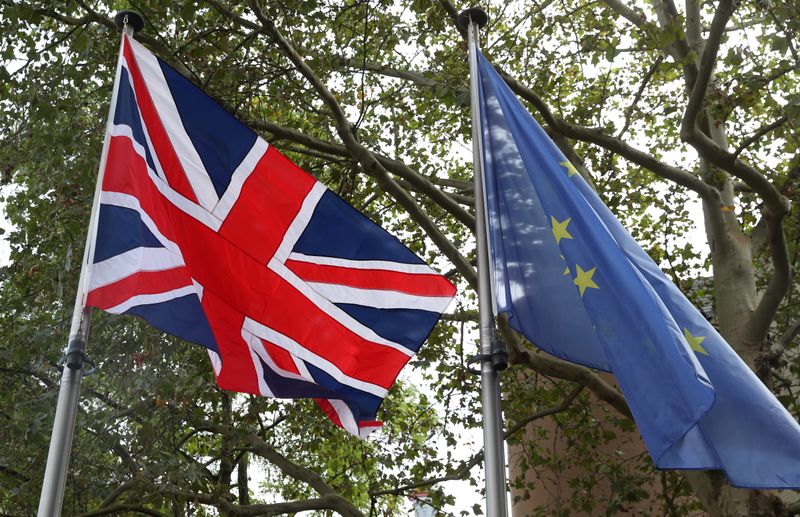By Gabriela Baczynska, Elizabeth Piper and Padraic Halpin
BRUSSELS/LONDON/DUBLIN (Reuters) - The European Union and Britain have so far failed to reach agreement on three most persistent sticking points in talks, both sides said on Tuesday, suggesting any breakthrough in securing a trade deal is still a way off.
After nearly two weeks of intensified talks to try to strike a deal to protect nearly a trillion dollars of trade from severe disruption, stubborn differences over fisheries, fair competition and settling disputes have yet to be overcome.
Irish Foreign Minister Simon Coveney said time may run out to strike a deal, adding that some progress on safeguarding economic fair play was not enough.
"If there is not a basic set of rules around fair competition... and if there is not a governance structure that can deal with disputes, then in my view there will not be a trade deal," Coveney told an online conference.
"There is some progress being made in this area but it's far from concluded yet."
Any deal should be agreed by Nov. 15 so it can be ratified by the European Parliament before Britain's standstill transition out of the EU expires at the end of the year.
Businesses hope that the time pressure and a COVID-19 crisis spiralling across much of Europe can focus minds on clinching a deal to avoid chaos in commerce, energy ties and aviation.
But even then, Britain's government and businesses will not be prepared, the Institute for Government (IfG) think tank said, describing disruption as inevitable in January with or without a deal.
Fisheries, a sector laden with symbolism for Brexit supporters in Britain, is proving an especially tricky problem, with London insisting on annual negotiations on quotas - a demand the EU resists.
"We have not yet found a solution on fisheries," a spokesman for the EU's executive European Commission told a news briefing. "We are not there yet. A lot more work remains to be done."
A spokesman for Prime Minister Boris Johnson said: "We'll only be able to make progress if the EU accepts the reality that the UK will have the right to control access to its waters.
"There are significant gaps that do remain between our positions in the most difficult areas, and there is much work still to be done if we are to bridge those gaps."
"SOBER"
Since leaving the EU in January after more than 40 years of membership, Britain has been locked in talks to build a new relationship covering everything from trade to defence to data sharing.
An EU diplomat said the bloc's Brexit negotiator, Michel Barnier, would give a "sober" assessment of the latest talks when he briefs the 27 national envoys to Brussels on Wednesday.
The talks have often been bitter and plunged to new lows after Britain introduced legislation that would breach its earlier Brexit divorce settlement with the bloc.
In response, the EU started legal proceedings and said it would not implement any new trade deal with Britain unless London honours its previous legal obligations. Brussels said on Tuesday it would escalate the dispute.
With tempers fraying, a second EU diplomat said disagreements persisted over the divvying up of fish stocks, including Britain's demand for annual negotiations.
"That's where we are stuck. They haven't moved beyond these items on fisheries," said the person, speaking on condition of anonymity.
A British source also said there had not been much movement on fisheries, while the prime minister's spokesman repeated that London wanted "a simple separate fisheries framework agreement which reflects our rights under international law".
France could lose most from Britain taking control over access to its waters and the EU demands a longer-term perspective for its fishing industry.

Ideas for a transition period from 2021 to help square the circle have yet to bear fruit as the sides remain apart on the length of any such arrangement and what exactly would come at the end of it.
